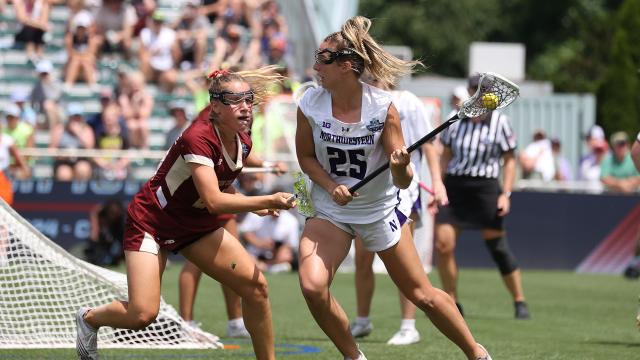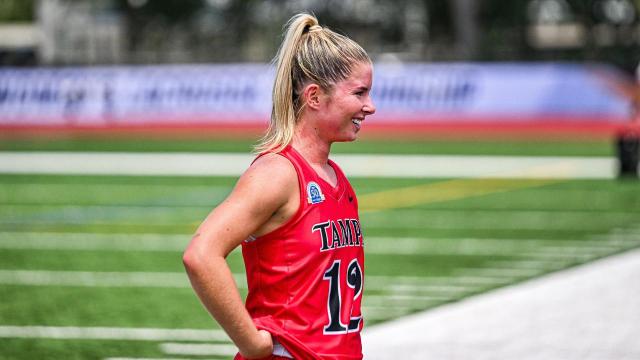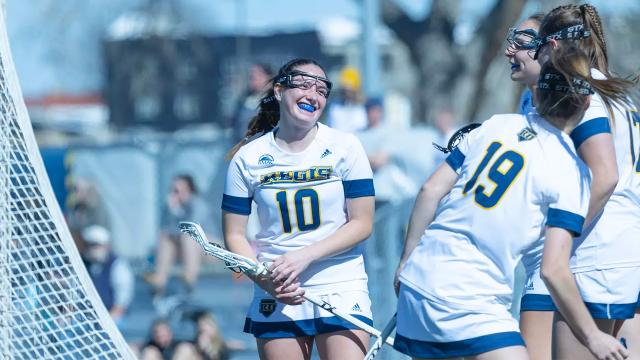
Voice of the Program
This story was originally published by Vanderbilt Athletics and publications writer Graham Hays. It is being republished with permission from Vanderbilt.
NASHVILLE, Tenn. — If it’s game day for Vanderbilt lacrosse, expect to find Michelle Sebastian enjoying a late breakfast and reviewing her notes at a restaurant near campus. She’s earned the repast. No one present had a longer commute. For the voice of the Commodores, now in her sixth season calling the action whenever lacrosse takes the field in Nashville, every game is a road game.
Her alarm goes off before five o’clock in the morning. She packs lunches and snacks for her three children, squeezes in a quick shower and grabs the travel bag set out the night before. Slipping out of the house while it’s still dark, she beats the worst of Chicago traffic on the drive to Midway Airport. With no bags to check, she arrives just in time to catch the day’s first flight—rarely full—to Nashville. A quick ride-share later and she’s digging into breakfast.
Almost without exception, she makes the reverse journey the same evening. No hotel needed. If she’s lucky, she arrives home in time to help with homework and get everyone to bed.
In between? She brings Vanderbilt home games to life as the voice on livestreams, which return this season on ESPN+. A student-athlete on the university’s first varsity lacrosse team nearly three decades ago, the sport has shaped her life’s journey ever since. Years of expertise allow her to convey strategy and nuance to viewers. Devotion to the sport and its opportunities inspires her to share the stories of those who continue to play. For parents and fans scattered around the country, and occasionally even farther afield, she brings Vanderbilt lacrosse to them.
Even if it means getting herself to Nashville first.
“It’s such a fun community,” said Sebastian, doling out particular credit to head coach Beth Hewitt, associate head coach Jill Kendall and executive director for operations Lisa Gracey. “Part of that is what they do for the girls. They believe that being happy and healthy makes you a better player. And that lacrosse, while it’s a game, it’s also a community and family. We want all these girls to have fulfilling, happy lives, so the game itself is not the end-all, be-all. But the game is the thing that brings us all together and why we’re all here.
“I really feel like that’s how we started all those years ago with those first teams. And that’s how it has continued. I don’t know that every place has that same feeling that we do at Vanderbilt. But it definitely makes us special, and I love that I’m still a part of that.”
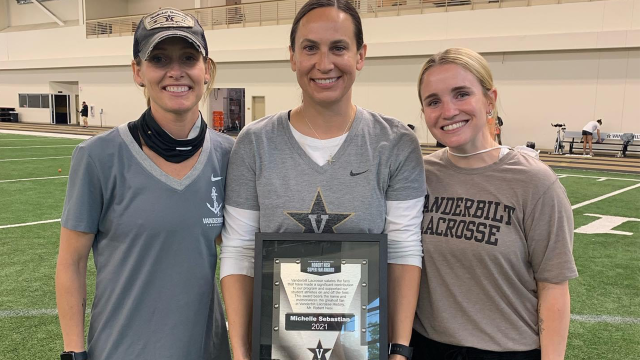
AN UNLIKELY LACROSSE JOURNEY
It might not surprise those who knew Sebastian in high school to learn that she now broadcasts sports. She played basketball and soccer competitively, plus she was a theater kid who sometimes sang the national anthem before her basketball games. She even spent time on stage doing stand-up comedy after graduating from Vanderbilt.
Those same people might be surprised, though, to learn that she’s the voice of a Division I lacrosse team. Because if you had put a lacrosse stick in her hands all those years ago, she would have had no more idea what to do with it than if you’d handed her bagpipes.
Though Northwestern is now a college lacrosse powerhouse, girls’ lacrosse wasn’t even a high school sport when Sebastian grew up in the Chicago area. Nor was it prevalent in the South when she arrived at Vanderbilt in 1993. A friend in Stapleton House, her first-year residence, convinced her to try out for what was then still a club team.
It took time to learn skills like cradling the ball, protecting it from defenders and gravity alike. But for someone who loved the challenge of one-on-one defense in basketball and whose best soccer traits were speed and the stamina to run all day, lacrosse was a revelation.
“It combined the elements of the sports I really liked—and changed them in a way that was so fun,” Sebastian said. “I was never the most skilled lacrosse player, but I was always one of the most athletic.”
She also became one of the most passionate. Members of the club team knew that Vanderbilt would begin playing a varsity schedule in the 1995–96 academic year. Sebastian wanted to be part of the team that debuted in NCAA competition. After each of her first two years, when it was still a club sport, she attended summer camps hosted by national powerhouse Maryland.
“It was literally 20-year-old Michelle and then high school girls at these lacrosse camps,” Sebastian said. “Did I feel like a nerd? Maybe, but I didn’t care. I was having so much fun learning this sport.”
Under head coach Wendy Stevens, Vanderbilt recruited elite high school talent out of the gate. Names like Sue Napolitano and Kristin Ehst still feature prominently in the record book. But Stevens couldn’t stock a whole roster with one or two recruiting classes. She needed committed holdovers from the club team. In Sebastian’s senior year, when she faced some of the same Maryland stars who had been her camp counselors, she earned a scholarship.
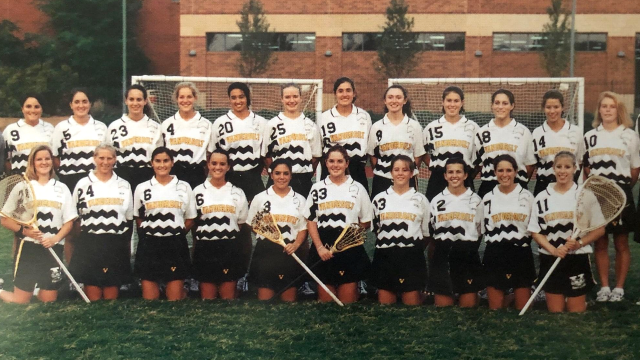
THE START OF SOMETHING
All of this took place against a backdrop of momentous change in women's sports. Months after Vanderbilt's first Division I lacrosse season, women's team sports stole the show in the 1996 Atlanta Olympics — from Dawn Staley and Lisa Leslie on the basketball court to Mia Hamm and Michelle Akers on the soccer field and Lisa Fernandez and Dot Richardson on the softball diamond. Women's sports offerings from the SEC soard.
As the only Division I women’s lacrosse team in Tennessee, and the only one at an SEC member school for more than a decade, Sebastian and her teammates were part of the inflection point. In their own way, they were pioneers. For today’s Commodores, talented student-athletes like All-AAC goalie Paige Gunning and All-AAC attacker Nancy Halleron, their counterparts on those original teams were every bit the trailblazers that Staley, Akers and Fernandez were on bigger stages. Sebastian and her teammates made Vanderbilt lacrosse something that changes lives to this day. They made it a place to grow, a community.
“We thought about it as this was our family away from the family, more so than thinking we were on the precipice of starting something big in women’s sports,” Sebastian said. “We were just so excited to take it D-I and prove ourselves. These people were my favorite people. We were such a strong unit together. The girls, we did everything together.”
CALLED TO THE BOOTH
Sebastian wasn’t ready to walk away from the path she discovered at Vanderbilt. Back in Chicago and working in finance after graduation, she joined a summer league that played on the shores of Lake Michigan. That led to coaching opportunities in youth lacrosse as the sport gained traction amid the rise in girls’ participation in sports. She dabbled in standup. She married and started a family. She stepped away from finance. Through everything, lacrosse was always a constant—coaching high school teams, coaching her daughters, starting a youth organization and eventually founding Be Gritty Recruiting, a consulting business helping athletes across a range of sports navigate the recruiting process.
And she never lost touch with her alma mater’s lacrosse program. Relationships with alumni have long been a priority for Hewitt, who began as Vanderbilt’s associate head coach in 2014 and became head coach before the 2019 season. During alumni gatherings, the coach and others had sometimes joked that Sebastian ought to call their games—a seemingly far-fetched idea for someone who lived in Chicago and a team that didn’t yet have the streaming reach of ESPN+. But when Vanderbilt hosted UConn in 2019 in a contest broadcast as the American Athletic Conference game of the week, the call went out. Could Sebastian do color commentary?
Not long after, Gracey asked Sebastian if she would be willing to make the trip more regularly in the 2020 season, calling games alone—doing play-by-play and commentary.
“Who is this?” Sebastian imagined the student-athletes thinking as she bounded around before her first few games. “Why is this lady here? Why is she talking to us like she is already friends with us?”
But it didn’t take them long to warm up to one of their own. Sebastian didn’t get to finish out that pandemic-shortened season, but her presence took on new importance when the team returned to the field in 2021. With long-distance travel and in-person attendance still difficult for many, Sebastian’s voice and the livestreams were a lifeline.
Many schools rely on announcers that are unfamiliar with the sport or inexperienced with a microphone, and those announcers rarely have resources available to look up any kind of history or player stats. Sebastian, though, knew the sport and knew the student-athletes. When she’s calling a game, there are no generic references to “a Vanderbilt player” doing something. She knows the names, and she knows their stories.
“I just wish there were more teams that had at least one former women’s player on there to really do a service to the girls,” Sebastian said. “That’s total credit to Vanderbilt and to the coaching staff that they think that it’s important.”
She still takes her preparation just as seriously. She’ll often run into student-athletes and parents over breakfast, picking up useful information. At the field, roughly an hour before the game, she’ll try and connect with the opposing coach to stay up to date—Vanderbilt fans aren’t the only ones watching the games, after all. Then she’ll talk to Hewitt and Kendall for anything she’s missed about the Commodores.
“You just want what’s best for them,” Sebastian said. “You want them to get what they deserve from all of their hard work and see those efforts highlighted. That’s just how I feel about it. And I’m glad that Vanderbilt agrees with me.”
No one knows better how much these years will shape everything that comes next. Or that Vanderbilt will always remain home.
No matter how long the commute.
Related Articles
